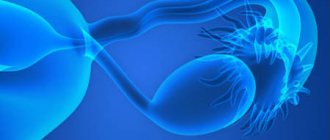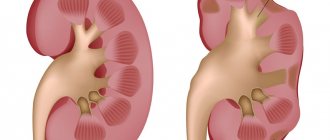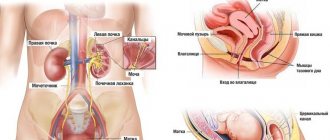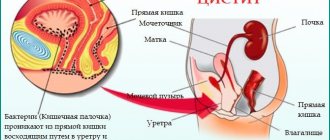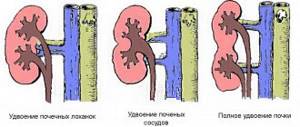The male prostate gland is located in the pelvic area. Its base faces the bladder, and its apex faces the pubic symphysis. The seminal and urethral canals pass through the gland, so the acute or chronic process of its inflammation becomes a causative factor causing the spread of the inflammatory process to the organs of the urinary system.
The presence of prostatitis in a man can negatively affect the functioning of the kidneys.
What is the danger of prostatitis for the kidneys and urinary system?
Prostatitis is a disease of the male prostate gland, characterized by an acute or sluggish course of the inflammatory process. If a man notices some signs of prostatitis (the main ones are urinary retention and pain), he should immediately consult a doctor in order to avoid unpleasant consequences for the urinary tract and kidneys.
Pain with urinary retention
The very first sign of prostatitis noticeable to a person is irregular urination. It occurs due to damage to the lower urinary tract associated with the length of the urethra. Because of this, pain and cutting in the groin and scrotum area, discomfort and aching pain when urinating may appear. Such characteristic signs will attract the attention of a man and force him to go to a medical facility.
Hematuria
Hematuria is a disease characterized by the presence of blood in the urine of a sick person. There are macro- and microhematuria. Gross hematuria is manifested by obvious blood in the urine, and with microhematuria, blood can only be detected when tested and examined in the laboratory. If a man has a prostate (inflammation of the prostate gland), he needs to be attentive to his health, periodically visit a doctor, take the necessary urine tests for examination, and undergo prescribed treatment in order to avoid the development of hematuria.
Urethritis and cystitis
Chronic prostatitis affects the occurrence of a disease such as urethritis - inflammation of the urethra. Urethritis is divided into infectious and non-infectious. It happens that the disease occurs without the above symptoms and is characterized only by pain during urination, to which sometimes a person does not pay much attention. In the case when a man does not want to go to the doctor and continues to live his everyday life, acute urethritis affects the duration of the disease and smoothly turns into a chronic form.
Cystitis is inflammation of the bladder. The cause of its appearance in men is an infection in the bladder. Infections are caused by Candida fungi, staphylococci, chlamydia and other microbes. Cystitis has an acute or chronic course. The acute form is manifested by cutting and pain when urinating, dark-colored urine comes out, and sensations of pain in the scrotum and groin area. The chronic form can last a long time with characteristic and functional changes in the bladder.
Pyelonephritis
Prostatitis can easily cause the development of a kidney disease (acute or chronic) such as pyelonephritis. The cause of pyelonephritis is considered to be bacteria that enter the kidneys through the blood, blood vessels or bladder. Pyelonephritis is divided into forms: primary and secondary. The primary form is characterized by microbial inflammation that occurs through the penetration of certain bacteria into an organ (in this case, the kidney). The secondary form is expressed by a congenital pathology of the kidney structure and is caused by such ailments as urolithiasis, hydronephrosis, etc.
Symptoms of acute or chronic (with relapse) kidney inflammation are somewhat similar to urethritis and cystitis: frequent and painful urination, dark-colored urine, pain in the lower back, pain under the ribs, one of the kidneys may hurt, a slight increase in body temperature to 37-37 .5 degrees, less often - diarrhea or vomiting. This disease is considered quite dangerous to human health, as it greatly affects the functioning of other vital organs.
Urolithiasis disease
Another common disease that can provoke chronic prostatitis is urolithiasis. The disease itself can be caused by various ailments, these include: dysfunction of the urethra, diseases of the urinary tract and others. The appearance of kidney stones is a rather long process that lasts for years. Treatment of this condition should be conservative or surgical, in both cases the treatment has a favorable outcome.
Hydronephrosis
This is a very unpleasant consequence that prostatitis can lead to. It is defined as hydronephrosis on the right and hydronephrosis on the left. This disease develops due to a violation of the outflow of urine, which is invariably accompanied by prostatitis. During the course of the disease, complete necrosis of one of the kidneys occurs. The main symptoms of the disease are: pain in the lower back and kidney (right or left), hematuria, fever, headache, nausea and vomiting. This is a very dangerous disease and therefore it is important to prevent in time the disease that affects it, that is, prostatitis, so as not to subject yourself to additional treatment.
Kidney failure
An advanced form of prostatitis leads to the provocation of a condition such as chronic renal failure - this is a complete cessation of kidney function due to damage to most of the kidney tissue. Symptoms of the disease will be: pain in the heart, gross hematuria, the whole body hurts and aches, kidneys hurt, swelling of the limbs occurs, nausea and vomiting appear. Chronic renal failure causes functional failure in all vital organs. Her treatment will have to be carried out with the help of highly qualified therapy and a competent medical approach.
Treatment
It is impossible to treat chronic prostatitis, but acute prostatitis must be treated with the utmost care in order to prevent unpleasant consequences. If you have prostatitis, you must visit your doctor frequently, take all the necessary tests, carry out diagnostics and, as necessary, adhere to the prescribed treatment.
To prevent inflammation of the prostate gland as the main disease, you need to be attentive to your health, not ignore the symptoms and, of course, follow a number of simple rules: give up bad habits, avoid hypothermia, follow a diet, and exercise. If you follow all the recommendations, then there is a chance that the disease and pain will subside or be prevented altogether. In this way, the man will maintain his health.
Source: etopochki.ru
How to restore your well-being
If severe pain develops that accompanies the process of inflammation of the prostate gland, the doctor usually prescribes painkillers. However, discomfort is only a superficial symptom of the disease and in order to get rid of it forever, it is necessary to cure the disease itself.
Pain develops after an excessive amount of secretion begins to form in the prostate gland, which does not come out due to blockage of the ducts. As a result, pressure increases inside the organ and causes first slight discomfort, and then (if left untreated) severe pain.
The doctor selects specific drugs for the treatment of prostatitis and, in particular, for pain relief, on an individual basis. This depends on the form of the disease, the stage of its development, the age of the patient and various physiological characteristics, such as the presence of concomitant diseases.
One of the main factors contributing to successful treatment is self-discipline.
It is very important not only to follow all the doctor’s instructions, but also to change your life: get rid of bad habits and unhealthy lifestyles, and go in for sports.
Causes of stones
Chronic diseases of the prostate gland, accompanied by prolonged stagnation of constantly produced secretions, lead to the formation of stones in the prostate gland. This:
- chronic bacterial and non-bacterial prostatitis;
- adenoma and prostate cancer;
- prostate hyperplasia.
The following factors further increase the likelihood of this pathology:
- chronic stress and fatigue;
- hypothermia;
- physical inactivity;
- excessive use of alcohol and tobacco;
- unstable sex;
- urogenital infectious and inflammatory diseases;
- urolithiasis disease;
- failure to keep the external genitalia clean
- injuring them.
Stones in the gland interfere with its normal functioning and cause a lot of discomfort in men.
What is prolit for the kidneys
Doctors often prescribe herbal medicines to treat kidney disease. People buy them on their own initiative, because they can help avoid more complex, expensive treatment. They are usually sold without a prescription. "Prolit" is one of them. Herbal medicines act quickly, because they are easily absorbed and do not interfere with the normal activity of other organs. They are able to compete with classical medications and can complement them.
Indications for use
What exactly do Prolit capsules help with, in what cases are they contraindicated, what is included in the composition, in what doses should they be taken, how do they work? This information can be found in the instructions for use. The instructions for use must be read before starting therapy. The first thing you should know, of course, is in what cases Prolit capsules help, that is, indications for use.
It is recommended to use this medicine:
- for prevention, treatment, elimination of symptoms of urolithiasis;
- elimination and prevention of inflammatory processes, including infectious ones;
- as a dietary supplement to the daily diet - to restore the balance of organic acids in the body, tannins, as well as panaxosides and potassium;
- to improve well-being during spasms, pain, which often appear during the displacement of kidney stones, during their movement through the urinary canals, from the bladder through the urethra;
- to eliminate inflammation;
- prevention of exacerbation of chronic diseases;
- as a diuretic;
- to improve glomerular filtration.
The drug can be used for significant and minor functional disorders, without structural changes in the genitourinary system, for strengthening the immune system, prevention, restoration of the body after severe, prolonged stress, in situations where there is a risk of developing such conditions.
It is possible to cure a disease with the help of medicines based on natural ingredients, without abandoning the treatment recommended by specialists. The only exception is when the doctor has forbidden you to take them. It is important to warn your doctor that you will be taking any medication other than those prescribed.
Release form
The release form chosen by the manufacturer is capsules. You can drink them in a public place or at home without attracting too much attention. It is enough to take mineral water with you. Treatment and prevention of urolithiasis, inflammation, and infections will not interfere with your normal activities.
There are two forms of release - “Prolit pills” and “Prolit super septo capsules”. They have the same composition, but the concentration of substances is different. In some cases this may matter.
First option
“Spill pills” are 100 capsules, which contain useful substances in a concentration sufficient to increase the effectiveness of antibiotics, pain relief, relieve spasms, improve the production and excretion of urine, normalize glomerular filtration, prevent negative processes in chronic diseases or weakened immunity, stress, voltage. The dosage can be adjusted by the person himself quite freely, focusing on his well-being. You can take one pill or several – up to five at a time. The drug should be taken three times a day.
Hydronephrosis
This is a very dangerous disease that can also develop against the background of prostatitis. The main danger of the pathology lies in its asymptomatic course and irreversible consequences. At an early stage, it is almost impossible to suspect the development of the disease without ultrasound and x-rays, since there are no symptoms.
Already at a later stage, pain occurs in the area of the kidneys, abdomen, and lower back (unilateral, bilateral). The development of the disease is always caused by a violation of the outflow of urine (urine returns back to the renal pelvis and stretches them until complete atrophy).
Men who have suffered for many years from chronic prostatitis and prostatic hyperplasia are at risk. And although it is impossible to independently suspect the development of this disease at an early stage, it is still worth keeping in mind that if your kidneys hurt with prostatitis, you cannot postpone going to the doctor.
What to do and how to normalize kidney function
The very first thing you need to do is go to a nephrologist or urologist, where the doctor will prescribe the necessary tests - pelvic ultrasound, general blood test, biochemistry and urinalysis. Even if prostatitis is just beginning to bother you, there is no need to self-medicate, because an incorrectly chosen regimen will only aggravate the situation.
Since the cause of the disease is primarily bacteria, antibiotics to treat the prostate gland, kidneys, and the entire urinary system. However, you should not think that you can prescribe this type of pill for yourself, because everything depends on their dosage, which is selected by an experienced urologist who knows all the intricacies of treatment. Usually, proper treatment eliminates the problem in less than one month.
In combination antispasmodics to relieve the unpleasant symptoms of prostatitis and kidney disease, this is especially true in later stages, when the pain becomes frequent and more acute.
Due to the fact that urine stagnates in the kidneys, inflammation begins, all this leads to disruption of the functioning of the entire body, in particular the immune system. To speed up the destruction of bacteria, the doctor prescribes immunostimulants - vitamins, microelements, antioxidants, enzymes, interferons. They are absolutely harmless to health.
In some cases, an excellent addition is prostate massage , which accelerates the flow of lymph and normalizes the functioning of the organ. Along with the massage, herbal remedies are prescribed, for example, lingonberry or bearberry leaves, which have a strong diuretic effect.
Do not be afraid of hormonal drugs; they reduce the production of male sex hormones, which provoke the growth of the prostate gland, thereby complicating the treatment process. Immediately after complete recovery, hormone therapy is discontinued.
Varieties
Chronic prostatitis with stones has its own characteristics. Prostate stones range from 0.2 to 2.5 cm in diameter. Their number varies from a single stone to several dozen inclusions. The shape is most often spherical, elongated or round. Stones in the prostate gland are divided into sensitive and insensitive to x-ray diagnostics.
They can have organic and inorganic composition. According to the mechanism of formation, prostate stones can be endogenous or exogenous. True inclusions of the prostate gland are formed directly in the male gland, false inclusions migrate from the bladder, kidneys, and ureters.
A true man's disease
Now it’s the turn to figure out what kind of disease this is – prostatitis – and what its features are.
Prostate inflammation
Prostatitis is called inflammation and swelling of the prostate gland, or rather its tissues.
Only men suffer from this problem and it’s clear why. Scientists have calculated that in our time, almost half of the male population of the Earth suffers from prostatitis.
Now it’s worth studying the main symptoms of this disease in order to be ready, if necessary, to consult a doctor yourself, or to tell your loved ones to do so. There are only three of them.
First of all, it is a painful sensation, a sting. They can appear in the genital area, as well as in the area of the urethra.
Another symptom of prostatitis already mentioned earlier in the article is increased urination. In addition to frequent urges, the process itself may become intermittent or difficult.
Well, sad as it may be, prostatitis contributes to the presence of problems of a sexual nature. This may include rapid ejaculation, decreased sensation during orgasm, and other dysfunctions.
Symptoms of pathology
Headaches, fever, general weakness have not been canceled either. But these symptoms relate more to such a general concept as a diseased organism.
How do men get sick?
The most common reason why prostatitis occurs is infections, and not just any infections, but sexually transmitted ones. Gonococcus, chlamydia, cytomegalovirus, candida, etc. All of them may one day end up in the prostate tissue.
Congestion associated with poor circulation in the prostate and nearby organs. They are usually the result of inactivity and a sedentary lifestyle, a preference for walking over constant use of public transport.
Prolonged abstinence by men or frequent interruptions of sexual intercourse also do not contribute to the improvement of the prostate.
Prostatitis can even be caused by reduced immunity, frequent hypothermia, psychological and physical stress, common vitamin deficiency, and imbalance of hormones in the body.
Prostatitis has one interesting distinctive feature - there is practically no acute form. The disease progresses slowly, the symptoms are sometimes blurred and can lead to even more serious consequences.
Prevention of pathology
You can avoid the development of inflammation of the male gland and the danger of further complications only if you are meticulous about your health. Preventative recommendations are quite simple. You should give up bad habits, introduce sports, daily walks and proper nutrition. By adhering to them, a man’s chances of staying healthy increase.
Source prourinu.ru
An infection that has entered the prostate tissue can spread beyond the organ. Pathogenic microorganisms that penetrate the kidneys cause acute or chronic inflammation and cause hydronephrosis, pyelonephritis, urolithiasis and other disorders.
On the other hand, infectious inflammation of the kidneys often provokes acute prostatitis. When a patient complains, it is necessary to identify the primary factor of pathological changes. Prostatitis and kidneys, or rather violations of their functionality, are interconnected.
Possible effect of prostatitis on kidney function
Since these two organs are closely interconnected, a malfunction of one of them leads to the illness of the second: when the prostate mucosa becomes inflamed, excess fluid accumulates in the bladder , which causes an inflammatory process throughout the entire urinary system. Then serious problems begin on both sides - urethritis and cystitis - the most common combination, when bacteria of the genus cocci, streptococci and candidiasis fungus affect the genitourinary system.
What complications may occur?
Any inflammatory process for the body does not pass without leaving a trace. Since the gland is surrounded by organs of the urinary system, pathogenic bacteria, entering first the gland and then the kidneys, can provoke the development of secondary diseases:
Prostatitis increases the risk of kidney stones or inflammation.
- ICD (urolithiasis);
- hydronephrosis;
- pyelonephritis;
- renal failure.
When the first sign of prostatitis (impaired urination) appears, a man should definitely consult a doctor. The main thing is to timely trace the connection between inflammation of the male gland and possible pathologies of the paired organ of the urinary system, establish the causative factor in the development of diseases and prevent their progression.
Urolithiasis
The formation of a stone takes a considerable period of time. The main cause of urolithiasis is considered to be impaired metabolism. But inflammation of the tissues of any organ of the urinary system can also trigger the formation of stones. KSD develops as a complication of inflammation of the male gland, which has become a chronic process.
Hydronephrosis
Urination disorder is one of the unpleasant, secondary consequences of inflammation. A characteristic sign of prostatitis is a violation of the outflow of urine, which negatively affects the functionality of the paired urinary organ. Right or left hydronephrosis is distinguished. As the male disease progresses, the kidneys hurt, and necrosis of one of them may develop.
The pathology is accompanied by the following symptoms:
- kidney pain;
- blood in the urine;
- nausea;
- headache;
- temperature rise of 37-38 degrees.
Pyelonephritis
Inflammation that causes damage to the pyelocaliceal system occurs under the influence of pathogenic bacteria that enter the organ with the blood or from nearby organs. Therefore, prostatitis carries a direct danger in the development of pyelonephritis. Depending on the cause of the disease, there are 2 forms of pathology:
- Primary. The development of pyelonephritis occurs under the influence of pathogenic microbes that have penetrated the kidney and does not occur against the background of other diseases.
- Secondary. Progresses against the background of various pathologies, including kidney stones, prostatitis or impaired urine outflow.
The inflammatory process can be recognized by the following signs:
- low-grade fever;
- pain when urinating and in the lumbar region;
- blood in urine.
Kidney failure
Untreated prostatitis can lead to kidney failure.
A long course of prostatitis, which develops into an advanced form, can provoke a serious complication, ending in a complete cessation of kidney function. The disease negatively affects the entire body. One or both kidneys may hurt, and additional signs of failure appear:
- swelling of the hands and feet;
- possible heart pain;
- muscle aches;
- nausea.
The development of renal failure requires prompt hospitalization and the necessary treatment methods.
Sources
- https://etopochki.ru/kidney/drugoe/prostatit-boli-v-pochkah.html
- https://ponchikov.net/health/urologiya/672-prostatit-i-pochki.html
- https://urologexp.com/boli-pri-prostatite-kak-i-gde-bolit/
- https://pochke-med.ru/simptomy/kamni-v-pochkah-prostatit/
- https://prostatit-m.ru/prostatit-i-pochki-est-li-vzaimosvyaz-i-chto-delat/
- https://promoipochki.ru/anatomiya-pochek/prostatit.html
- https://ProUrinu.ru/inoe/o-pochkah/prostatit-i-boli.html
[collapse]
Differences between the symptoms of cystitis and urethritis
But no matter how similar the diseases are to each other, there are a number of differences that help differentiate them.
| Cystitis: | Pyelonephritis: |
| Inflammation covers only the mucous surface of the bladder. | The infection affects the kidneys, causing structural changes in them (in the chronic type). |
| It can be not only bacterial, but also allergic in nature. | Inflammation occurs in the presence of stones or in case of infection with pathogenic bacteria. |
| Does not affect the functioning of the kidneys, does not disrupt their filtration function. | It is considered a kidney pathology and affects the functioning of organs, reducing their functional abilities. |
| Leads to the development of a match process on the walls. | It has no effect on work, affects only the kidneys, and occurs with a violation of the outflow of urine. |
| May cause urinary incontinence. | Leads to kidney failure if complications develop. |
There are a number of distinctive symptoms that help to make a correct diagnosis for the patient and prescribe adequate therapy.
Both diseases are characterized by damage to the genitourinary system. Their signs are quite similar. How to distinguish cystitis from pyelonephritis is helped by their severity and localization.
- With inflammatory damage to the urinary bladder, the severity of general symptoms, in most cases, is insignificant. The prevailing local symptoms are dysfunctions in the urinary system: dysuria, disturbances in mictions and detrusor functions, causing additional pain, a portion reduction in urine output per miction, the presence of false (imperative) urges, etc.
- Signs of the development of renal pathology - pyelonephritis are characterized by the severity of general symptoms - high temperatures, chills and the manifestation of hyperhidrosis (sweating), clear signs of intoxication (loss of strength, extreme tiredness and fatigue, insomnia, insomnia and poor appetite) due to the influence of pathogenic toxins. Painful symptoms of various types (paroxysmal, aching or dull) are localized in the lumbar area in the projection of the affected kidney. Acute pain syndrome, in the form of renal colic, can provoke stones that block the urethral lumen.
Dysuric signs appear only in the case of secondary development of inflammatory processes in the bladder.
Both diseases are characterized by the development of focal inflammatory reactions in the mucous membrane of organs - the reservoir cavity of the bladder and in the cavity walls of the urethra. In addition, the causes of the disease and symptoms are almost the same. But there is still a difference between cystitis and urethritis, and their timely identification will significantly reduce the duration of therapy.
The signs of one and the other pathology are largely identical. In both cases, similar dysfunctions in the processes of urination are noted.
Attention should be paid to the fact that with urethritis, urine does not have a specific odor, pain is local in nature, manifests itself mainly in the pubic area, mucous purulent discharge from the urethral canal is noted and inflammation can spread to the mucous membrane of the vaginal cavity, and the addition of bacterial flora often provokes the development of bacterial vaginosis.
It is difficult even for a specialist, let alone a patient, to independently identify a disease based on signs alone. The pathology is usually clarified using a diagnostic method.
